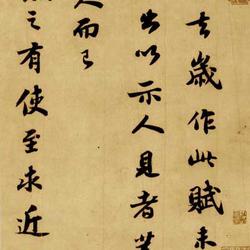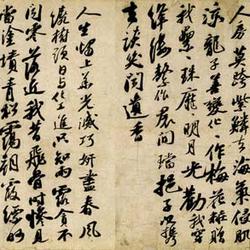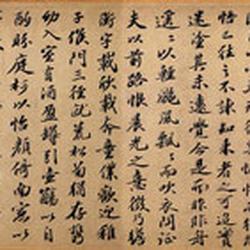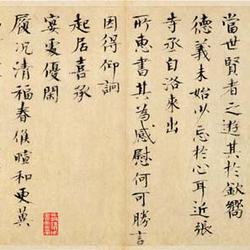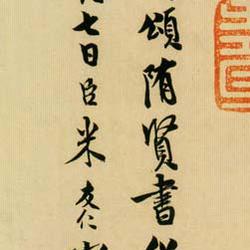
"Huangzhou Cold Food Poems", paper version, 25 lines, 129 words in total, is Su Shi's representative work in running script. This is a poem of excitement, a sigh of life written by Su Shi on the Cold Food Festival in the third year after he was demoted to Huangzhou. The poem is desolate and sentimental, expressing Su Shi's melancholy and loneliness at this time. The calligraphy of this poem was inspired by this mood and situation. The calligraphy throughout the text is full of ups and downs, radiant and unrestrained, without any rash strokes. "Huangzhou Cold Food Poems" has a great influence on the history of calligraphy. It is called "the third running script in the world" and is also the best among Su Shi's calligraphy works. As Huang Tingjian wrote after this poem: "This book combines the writing styles of Yan Lugong, Yang Shaoshi, and Li Xitai. I tried to make Dongpo recreate it, but it may not be as good as this."
Explanation: It has been three days since I came to Huangzhou. I want to cherish spring every year, but I don’t want to regret it when it is gone. This year it rained hard again, and autumn was bleak in two months. I lie down and smell the begonia flowers, the muddy swallows are covered with snow. I secretly carried it away. I was really weak in the middle of the night. He was a sick young man. His illness had already begun to turn white.
Spring River is about to enter the house, but the rain keeps coming. The hut is like a fishing boat, in the misty water and clouds. The empty kitchen is used to cook cold vegetables, and the broken stove is used to burn wet reeds. I didn't know it was cold food, but I saw a bird holding a piece of paper. The king's gate is nine levels deep, and his tomb is thousands of miles away. I also want to cry and be poor, and I can't afford it.
The gloomy images in the poem such as huts, empty shops, black paper, graves... create a gloomy and melancholy artistic conception. It expresses the author's gloomy and depressed mood when he was relegated to Huangzhou due to bad luck. From the article "The empty kitchen cooks cold vegetables, the broken stove burns wet reeds", we can imagine his embarrassment life. These two poems are not among Su Shi's more than 3,000 poems, but they are not his best works. And when the author switched to another art form - calligraphy to express it, the desolate artistic conception brewed by the colorful and rich calligraphy imagery made "Huangzhou Cold Food Poems" an eternal masterpiece.
"Huangzhou Cold Food Poems" shows the momentum and is filled with ups and downs of emotions. The poem is desolate and melancholy, and the calligraphy was inspired by this mood and situation. The whole article is full of ups and downs, fast and steady, full of joy, and completed in one go. Su Shi embodies the changes in mood and emotion in the poems in the changes of pointillism lines, either front or side, changing and disconnecting smoothly, making it natural. The characters are also strange, big or small, sparse or dense, light or heavy, wide or narrow, staggered and scattered, random and strange, and ever-changing. No wonder Huang Tingjian was bowed by it and sighed: "Dongpo's poems are like Li Taibai's, but I'm afraid Taibai is not everywhere. This book combines the writing styles of Yan Lugong, Yang Shaoshi, and Li Xitai. Trying to reproduce it from Dongpo may not be as good as this." "("Huangzhou Cold Food Poetry Postscript") Dong Qichang also wrote a postscript praising: "I have seen no less than thirty volumes of Mr. Dongpo's original works for the rest of my life, and I must take this as my first opinion." "Huangzhou Cold Food Poems" is the best of Su Shi's calligraphy works and has a great influence on the history of calligraphy. Yu Shu of the Yuan Dynasty called it "the third running script in the world" after Wang Xizhi's "Lanting Preface" and Yan Zhenqing's "Nephew Memorial Manuscript" ".

